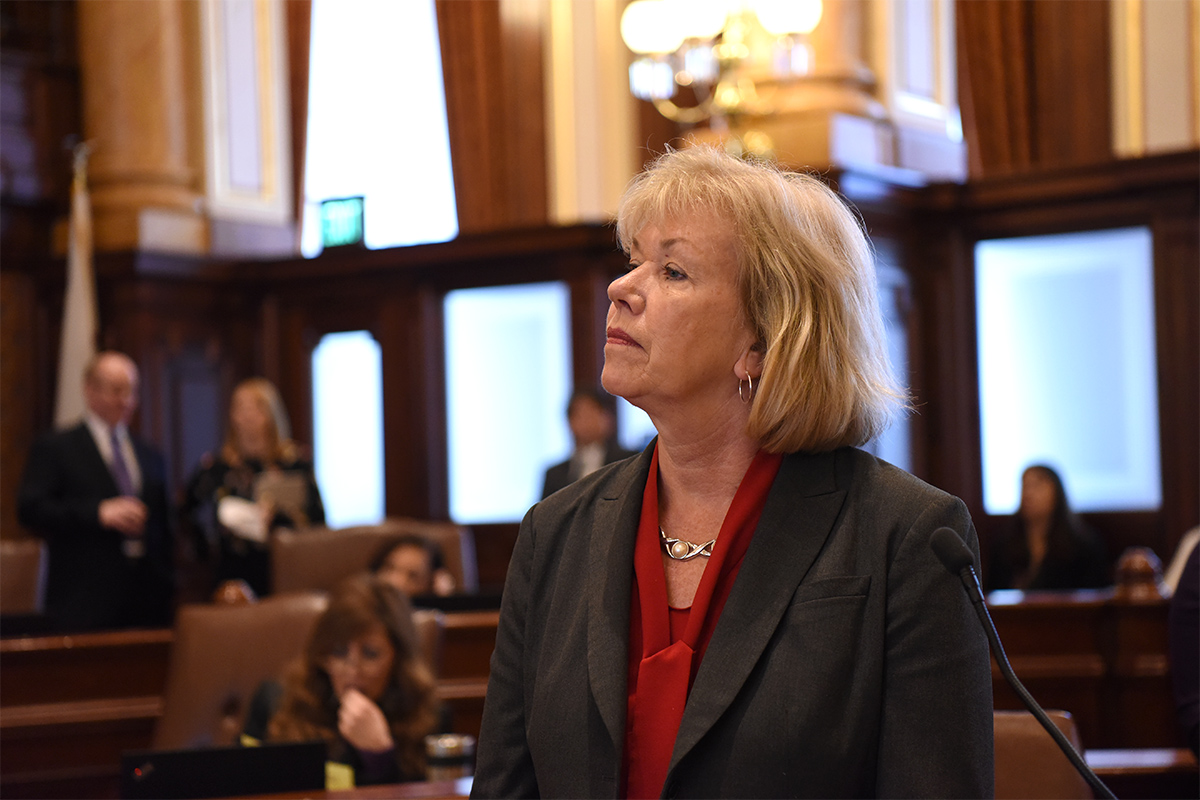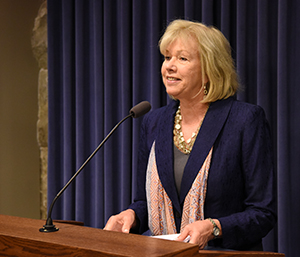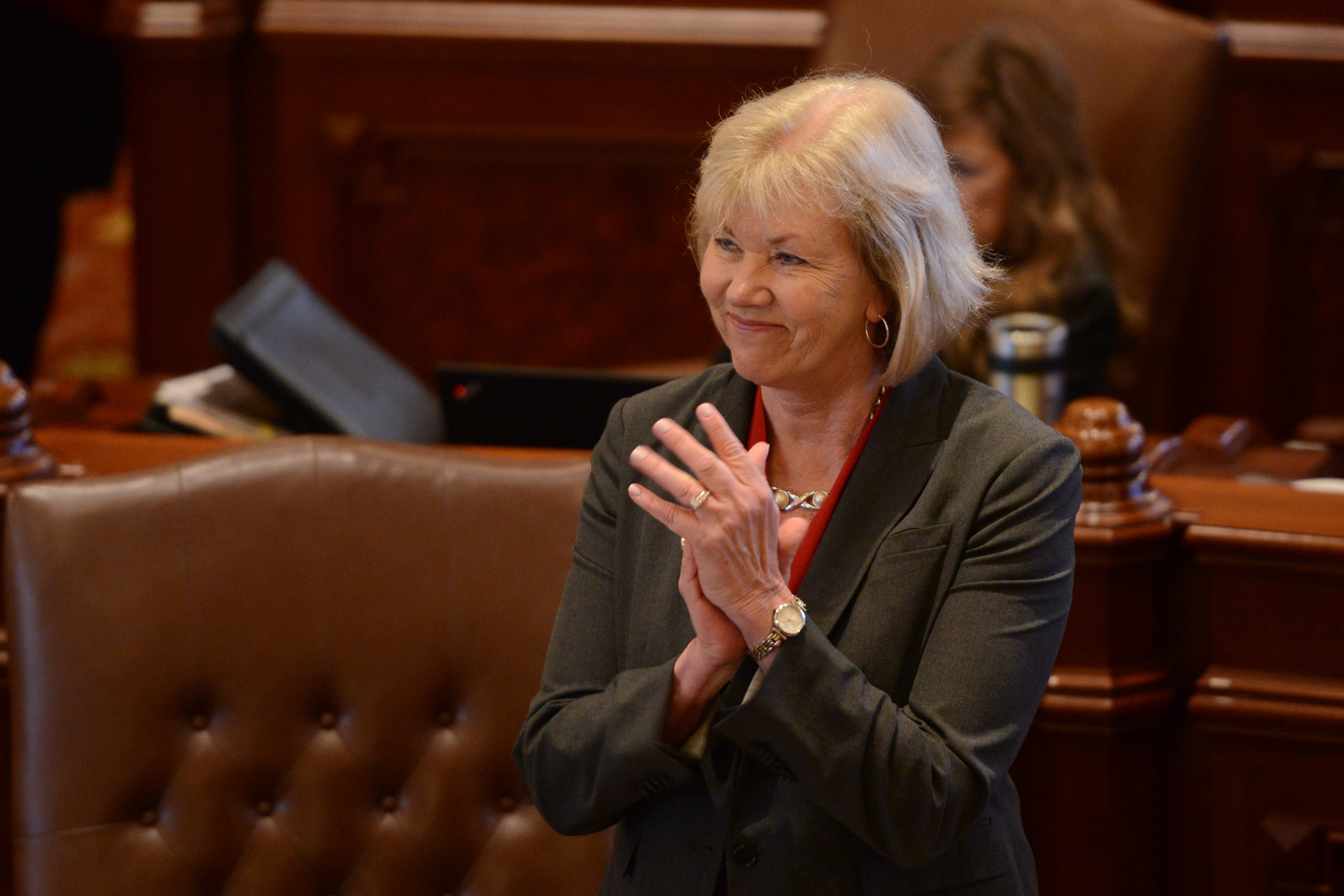Morrison: Fix the FOID will save lives, end backlog
- Details
- Category: Latest News
HIGHWOOD — As other members of the General Assembly raise concerns about the FOID card backlog and outline a Second Amendment agenda, State Senator Julie Morrison (D-Lake Forest) is encouraging her colleagues to support the final push for her comprehensive firearms measure.

“Fix the FOID is not anti-gun — it simply ensures guns are not possessed by people who should not legally have them,” Morrison said. “Fingerprinting everyone who applies for a card will help raise red flags if that person has a violent criminal history that should keep them from having a firearm.”
Senate Bill 1966 would make key changes to Illinois’ current FOID system, requiring background checks for all gun sales, requiring applicants to submit their fingerprints, requiring FOID renewals every five years instead of 10, and creating a task force within the Illinois State Police to prioritize FOID card revocations when there is clear and present danger.
It would also increase the FOID application and renewal fee from $10 to $50. However, that funding would also go to the state police to help them do their job of processing and administering FOID cards, which would help with backlogged requests.
Prior to the onset of the COVID-19 pandemic, Morrison was confident it would soon be on its way to the governor’s office, as it just needed final approval from the Senate.
The measure was brought to life in response to the February 2019 shooting at the Henry Pratt building in Aurora. The shooter had received a FOID card in January 2014, after lying about a conviction that would have caused him to fail the background check.
Illinois State Police Director Brenden Kelly said in February that the fingerprinting aspect of the measure could have prevented the tragedy.
“I firmly believe we have developed the framework that would keep guns out of the hands of people we know would present a risk to themselves or others,” Morrison said. “I hope to see this measure cross the finish line next month, so we can finally close to the loopholes in gun laws.”
Morrison has requested the measure be brought up during the Senate’s anticipated January lame-duck session.
Senators Johnson, Morrison: A warm home is a basic human necessity
- Details
- Category: Latest
LAKE COUNTY, Ill. — As the cold winter months begin and the COVID-19 pandemic continues, State Senator Adriane Johnson (D-Buffalo Grove) and State Senator Julie Morrison (D-Lake Forest) urged Gov. JB Pritzker to establish a new moratorium against utility shut-offs.

“The high cost associated with electricity and gas bills during the winter months are already difficult for so many at-risk families — the addition of layoffs stemming from the ongoing public health crisis will make it even harder,” Morrison said. “No one should have to worry about how to keep their family safe and warm. A warm home is a basic human necessity that absolutely no one should have to go without.”
Johnson and Morrison, alongside other members of the Illinois Senate, sent Pritzker a letter Monday, urging him to establish a moratorium against utility shut-offs this winter. Although the Illinois Commerce Commission previously negotiated a voluntary moratorium with some companies — it’s not mandatory, nor have all companies signed on. The members of the Senate who sent the letter told the governor Illinois residents need assurances that they will continue to have heat, even if the pandemic causes them financial hardship.
“Families are already coping with the stress of potentially becoming ill from COVID-19. We must alleviate further potential illness stemming from a lack of proper heat,” Johnson said. “We, as Illinoisans, must continue to be nationwide leaders who show that we will prioritize every person’s needs — regardless of financial background, race or ZIP code.”
Morrison and Johnson urge Pritzker to immediately create a utility moratorium plan.
Morrison commends Maryville Academy on grant to help serve vulnerable youth
- Details
- Category: Latest
DEERFIELD – State Senator Julie Morrison (D-Lake Forest) is congratulating Maryville Academy in Des Plaines on receiving a $200,000 state grant for a six bed expansion to serve at-risk adolescent females.

“Maryville and the other recipients of this grant have the critical job of serving the most vulnerable of our youth,” said Morrison, who has worked for years to improve the quality of care received by youth served by the Department of Children and Family Services. “It’s great that this grant will allow them to serve more young women.”
These DCFS-awarded Residential Capital Improvement Grants were funded by the General Assembly to increase bed capacity and program funding for medically complex youth and youth with severe mental health issues.
“Expanding residential homes like Maryville means that girls and young women of Illinois get the help they need,” Morrison said. “With the ongoing public health crisis, supporting these populations is more important than ever.”
Six residential and group homes were awarded grants, totaling $866,000, to help replace some of the more than 500 residential beds the state has lost in recent years.
Senators Morrison, Johnson congratulate local museums for grant award
- Details
- Category: Latest News
LAKE COUNTY, Ill. —State Senators Julie Morrison and Adriane Johnson are congratulating a number of Lake County-based museums who were awarded part of a $22.8 billion grant to improve facilities and develop new exhibits.

“Museums serve as a place for people to explore, families to bond and children to learn,” said Morrison (D-Lake Forest). “Due to the ongoing public health crisis, many of these outstanding facilities have lost money, despite continuing to share their facilities with the public through new virtual ways.”
Buffalo Grove Park District was one of more than three dozen institutions to receive part of the $22.8 million in funding. The Educational Gardens at The Nature Classroom program through the park district received $246,000.
“Museums and the exhibits and programs they offer help tell a story of our community and state’s history,” said Johnson (D-Buffalo Grove). “The additional funding will allow these institutions to expand, grow and create more opportunities for Lake County residents and all who visit.”
The Illinois Public Museum Capital Grants Program, spearheaded by the Illinois Department of Natural Resources, was open to any museum operated by a local government or located on municipally-owned land.
The Waukegan History Museum Expansion at the Carnegie Center through the Waukegan Park District, located in the district Johnson represents, also received $750,000 in assistance through the grant program.
Additionally, the Chicago Botanic Garden, located in the district Morrison represents, received $750,000 for water main improvements.
For more information on the Museum Capital Grant Program, visit the Illinois Department of Natural Resource’s website.
More Articles …
Page 75 of 133





